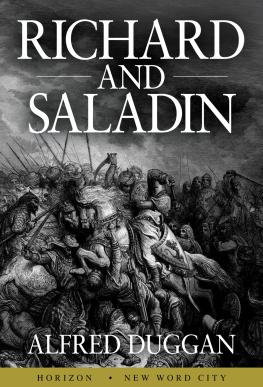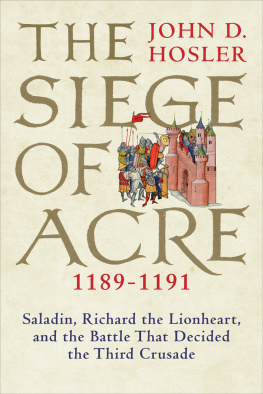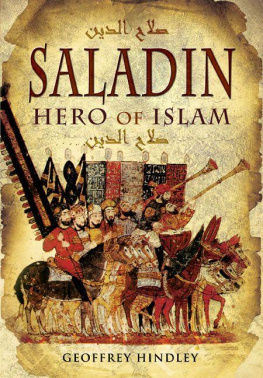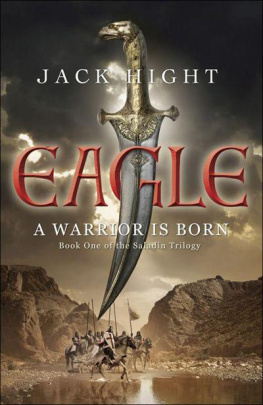Alfred Duggan - Richard and Saladin
Here you can read online Alfred Duggan - Richard and Saladin full text of the book (entire story) in english for free. Download pdf and epub, get meaning, cover and reviews about this ebook. year: 2016, publisher: New Word City, Inc., genre: History. Description of the work, (preface) as well as reviews are available. Best literature library LitArk.com created for fans of good reading and offers a wide selection of genres:
Romance novel
Science fiction
Adventure
Detective
Science
History
Home and family
Prose
Art
Politics
Computer
Non-fiction
Religion
Business
Children
Humor
Choose a favorite category and find really read worthwhile books. Enjoy immersion in the world of imagination, feel the emotions of the characters or learn something new for yourself, make an fascinating discovery.
- Book:Richard and Saladin
- Author:
- Publisher:New Word City, Inc.
- Genre:
- Year:2016
- Rating:4 / 5
- Favourites:Add to favourites
- Your mark:
- 80
- 1
- 2
- 3
- 4
- 5
Richard and Saladin: summary, description and annotation
We offer to read an annotation, description, summary or preface (depends on what the author of the book "Richard and Saladin" wrote himself). If you haven't found the necessary information about the book — write in the comments, we will try to find it.
Richard the Lionheart of England and Sultan Saladin of Egypt and Syria met in a bloody war for the Holy Land. But the champions of Christendom and Islam gave the medieval world a lesson in the honor of kings. Here, in this essay from the respected British historian Alfred Duggan, is their story.
Alfred Duggan: author's other books
Who wrote Richard and Saladin? Find out the surname, the name of the author of the book and a list of all author's works by series.
Richard and Saladin — read online for free the complete book (whole text) full work
Below is the text of the book, divided by pages. System saving the place of the last page read, allows you to conveniently read the book "Richard and Saladin" online for free, without having to search again every time where you left off. Put a bookmark, and you can go to the page where you finished reading at any time.
Font size:
Interval:
Bookmark:
On June 8, 1191, King Richard Coeur de Lion joined the besiegers of the then-Palestinian port city of Acre, who in a curious turn of events were themselves besieged by the great army of Saladin. Richard was thirty-three and already a veteran, leading armies since he was sixteen. He was not only a brave knight but also a skilled commander, especially expert in siege craft and in the dull business of looking after supplies. He was tall and fair and handsome and was as well known for his poetry as for his courage. He loved beauty in every form and could inspire in his followers a lifelong devotion. But there were weaknesses in his character. His witty poets tongue could turn sharp and acidic; in any company, he must be first; he was stern, unyielding, combative and greedy.
For two years, he had been Englands king, but his throne was not secure; John, his younger brother, would displace him if he could. Nonetheless, he and King Philip of France had sworn to reclaim the Holy Land together. After a winter in Sicily and a detour by Richard to Cyprus, they moved on separately to join the Third Crusade already in progress on the Palestine coast.
On the European continent, France and England had been quarreling for a generation. Recently, Richard had made matters worse by refusing to marry Philips sister Alice, to whom he had been betrothed since childhood, giving as reason the rumors that she had been his fathers mistress. To clinch the matter, Richards mother brought Princess Berengaria of Navarre down to Sicily, and Richard married her on the island of Cyprus.
Relations between the two monarchs could scarcely have been worse. And although Richard had brought to Acre a finer body of troops and a larger sum of money than Philip, he could not command an army that contained the king of France because, as duke of Aquitaine, he had previously done homage to Philip. So Richards intention was to clear up the mess in Palestine and get home as soon as possible before trouble broke out in England.
However, the mess in this part of the world, known as Outremer (French for overseas) presented many complications. Almost 100 years earlier, in 1095, Pope Urban II had called upon Christian Europe to rescue the Holy Land from the infidels. In that First Crusade, groups of Frankish and Norman knights had assembled large retinues, crossed Europe, fought their way through Asia Minor, and finally managed to wrest Jerusalem from its Egyptian rulers.
But these restless, ambitious adventurers had come to make their own fortunes as much as to restore the Holy Places. Each knight seized and secured what he could for himself, warring constantly with his Christian neighbors. Thus, the Christian community was scarcely unified. It consisted principally of the kingdom of Jerusalem, which stretched from the Egyptian border to Beirut, and three associated states of Antioch, Edessa, and Tripoli, covering what is now Syria, southeast Turkey, and Lebanon. Edessa was retaken by the Muslims in 1144; its fall occasioned a second and wholly unsuccessful crusade.
Each of the remaining states was governed by hereditary descendants of the original knights, who carried on the feuds of their forebears. Toward the end of the twelfth century, the king of Jerusalem, a leper, died childless, leaving two sisters whose marriages assumed supreme political importance. Sibylla, the elder sister, married Guy de Lusignan, a native of France, and they became king and queen of Jerusalem. Her teenage half-sister, Isabella, married Humphrey of Toron (now southern Lebanon), the son of a native baron.
King Guy was heartily disliked by the local lords because he was both ineffectual and a foreigner. The ensuing quarrels so weakened the Christian community that in 1187, Saladin, sultan of Egypt and Syria, marched upon the Christians at Hattin, near present-day Tiberias, captured King Guy, and destroyed most of the Christian forces. The Muslims then swept through Judea, taking the Holy City and many castles of the hill country. When news of this disaster reached Europe, the pope called for a third crusade.
By the end of the year, the Christians held only the seaport of Tyre, and that city had been preserved by a strange stroke of luck. Its frightened defenders had already asked for terms when Conrad of Montferrat (now northwest Italy), arriving from Constantinople, rallied the city to hold out until reinforcements could save it. Conrad became, thereby, a local hero. Most of the lay barons throughout Outremer rallied to him, and it was suggested that he marry Princess Isabella, which would at least give him a rival claim to the throne of Guy and Sibylla.
Conrad was said to have left one wife in Italy and another in Constantinople, and Isabellas marriage to Humphrey of Toron was annulled against her will. She liked the gentle, charming young man who had been kind to her, and she did not at all fancy the rough old soldier. (It is said that Humphrey, who had homosexual leanings, had neglected to consummate the marriage. Later, he and Richard, who also was rumored to be fond of handsome young men, became close friends, which did not help matters.)
When King Philip of France reached Acre in April 1191, six weeks before Richard, he encountered a strong movement to displace King Guy and make Conrad king of Jerusalem. The barons of the kingdom, sprung from French families, treated Philip as their natural lord; he, in turn, willingly supported their favorite, Conrad. Richard, upon arrival, backed Guy, partly because he refused to accept any of Philips notions and partly because King Guy came from Richards French domain of Poitou. Shortly thereafter, a compromise was made whereby Guy would retain the crown during his lifetime (Sibylla had died without surviving issue), and then Conrad would assume the throne. This decision pleased no one and lasted only eight months.
Richard had other enemies. Because his sister Matilda was married to Henry the Lion, a hated foe of the Hohenstaufen emperors, the German Crusaders who preceded both the French and the English at Acre also distrusted him. Thus, Richard went into battle with the French, most of the native barons, and the Germans - all hostile to him for different reasons.
But Saladin, encamped behind the besiegers of Acre, saw only that the Christian army had been reinforced by a mighty warrior. He made even greater efforts to relieve his blockaded city, for a great defeat might destroy his power.
Saladin was a self-made sultan. He lacked the prestige of hereditary rule, and unless he led his men to victory and plunder, they would desert him. His horsemen were Kurds (he was himself a Kurd) or Turks; his foot soldiers, Sudanese; and his indispensable sappers and miners, Egyptian. All his soldiers hated the climate of the unhealthy coast, ravaged and stinking after four years of war. They would not stay unless they were paid punctually, and the money to pay them could come only from Egypt.
In 1191, Saladin was fifty-three and in poor health. But the Holy War was the great objective of his life.
Saladin had won his dominions in war, but he did not charge at the head of his troops. In battle, his station was with the reserve; there is no record that he ever used his sword, save to kill unarmed prisoners after victory. Yet he was fearless, and if his army seemed to be beaten, he would hold his ground to the last.
In every respect, he was the pattern of a Muslim ruler. Though he never found time to make the pilgrimage to Mecca, he said his prayers regularly and kept the fast of Ramadan. He loved to listen to readings from the holy books, even while he rode down the front of a hostile army.
He was a charitable man, also known for being just and for keeping his word, even to Christians. His mercy was famous, but it was a Muslim mercy, not to be judged by Christian standards. When Jerusalem surrendered to him, 60,000 Christian refugees were in the town, and he set their ransom at the moderate figure of ten dinars per person. The money in the city treasury was applied toward this ransom, though Saladin might have claimed it as booty; to please his brother Saphadin, he freed 1,000 captives and permitted the patriarch to beg off another 700.
Next pageFont size:
Interval:
Bookmark:
Similar books «Richard and Saladin»
Look at similar books to Richard and Saladin. We have selected literature similar in name and meaning in the hope of providing readers with more options to find new, interesting, not yet read works.
Discussion, reviews of the book Richard and Saladin and just readers' own opinions. Leave your comments, write what you think about the work, its meaning or the main characters. Specify what exactly you liked and what you didn't like, and why you think so.








